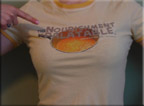Pesach
You may be a preacher with your spiritual pride,
You may be a city councilman taking bribes on the side,
You may be workin' in a barbershop, you may know how to cut hair,
You may be somebody's mistress, may be somebody's heir
But you're gonna have to serve somebody, yes indeed
You're gonna have to serve somebody,
Well, it may be the devil or it may be the Lord
But you're gonna have to serve somebody."
Gotta Serve Somebody
" by HaRav Bob Dylan
It's erev Pesach. I want to write a dvar Torah for Pesach, but I just read something so eloquently simple in my favorite hagadah (Lehmann's Passover Hagadah) that I want to just say what Rabbi Dr. Marcus Lehmann (of Mainz) over to you. Only, it's about a page and a half of tiny font, so I'm just going to give you highlights...
We are celebrating the festival of liberation, liberation from the yoke of slavery. Our forefathers left the land of slavery as free men. Freedom is man's valued possession since only through it does he become a real man...But apart from this "bodily" freedom there are other kinds of freedom which must be attained to achieve true personality, namely freedom of mind and freedom of action. He who languishes in the bonds of ignorance is not free, even if he is seated on the highest throne; he who cannot subdue his passions is not free, even if he rules over countries and peoples.
Not to point fingers at anyone, but to a couple of particular people who have used similar arguments with me: "He who languishes in the bonds of ignorance is not free" means that those who say, "well, if I can't see it, hear it, smell it, taste it, touch it, or know of its existance through scientific studies, it doesn't exist" are just allowing themselves to be bound by their human capabilities which is, aside from limiting, a form of bondage. You're really just a stupid human being, you two, if you think that you are the be all and end all. But that's my opinion...and I'm sure people think I'm just stupid for that. Oy...now I continue...
Freedom of mind, however, consists neither of great learning nor of the amassing of vast stores of knowledge; there have been many great scholars whose minds were not free. Freedom of mankind requires the proper knowledge of what is essential for mankind to know. What we are, why are we on earth, what is the meaning of our life and our activities, for what should we strive, what is the ultimate purpose of our existence?
Rabbi Dr. Lehmann then goes on to explain that these questions have, of course, been pondered on by many great minds through out time. But that often, the truth is lost because, "their outward appearance is often misleading. There are things that appear to be immutable and permanent, whereas in fact they are mutable and impermanent." He argues that to us, "the truth has been revealed about the nature and origin of things. The one Almighty God is the Creator of the universe, which He [sic :)] created for His glorification; and man's task on earth is to live according to the will of the Holy One...It is only when we have grasped this concept that our minds and thoughts are truely free." Now, whether you agree with him or not...and I have a few problems with his phrasings, he at least gives a great starting point.
Let's see how much of his best 'graph I can manage to type before losing feeling in my fingers:
Freedom of the body and of the mind only acquires their true value through freesom of action, freedom to do good and avoid evil. Great thinkers of all times have denied this freedom of action because they have not attained true freedom of mind.
No sources here, but just read it for his ideas, I guess...
According to them everything, including man, merely obeys the laws of necessity; an upright man is not good, nor a vicious man bad, of his own free will, but because he has to be so. According to this concept, no man is responsible for his actions; and the ideas of virtue and vice, of right and wrong, must cease to exist. This sorry attitude is unfortunately prevalent in our times in the form of so-called determinism. It arises from the fact that its adherents do not believe in a personal God. A personal God is the source of all freedom of choise. He created the world of His own free will, and man, endowed with a soul and free-will, is its most important element. Only that God, who is alone free, for whom there is no compelling necessity, could endow His creation, mankind, with free-will. And that is why the Hagadah adds, "Blessed be Hi." We must think of the All-embracing Ever-present God, not as a sort of godhead without intention or design that would be subject, like the whole of nature, to the laws of necessity. God is not only in the whole world, but the whole world without compelling necessity as it emerged from His creative Hands. He imposed the laws of nature, and can at any time displace or alter them, according to His holy will and wise judgment. He is not only the Creator but also the Governor of the universe. He altered the laws of nature when He liberated His people from Egypt, by temporarily removing the great mass of water so that His people might go dry-shod through the sea, and then letting the floods rush back to bury empty and uncultivated land; He caused...He revealed Himself to the whole people in His glory and majesty and proclaimed to them the basis of all freedom of mind and of action, "Bless be He who hath given the Torah to His people Israel."
Through the Torah we have aquired a firm basis and foundation for every form of investigation. It teaches the nature and origin of things; through it, our thoughts arise to God; through it, we acquire knowledge of our own nature, the purpose of our existence, and the objective of our efforts.
...Belief in the one personal God must form the basis of our existence, for if this basis is lacking, even study of Torah and the compliance with its commandments are of no real value. It is only through this recognition, this belief in the one personal God, that we are human beings, that we are Jews.
Another interesting concept:
The Natziv says that in the intro to sefer Shemot, it is referred to as the "second book." Shemot, he explains, is the second half of Beresheit. Beresheit is about the physical creation of the world and Shemot is about the spiritual completion, or fulfillment, of creation. Beresheit is full of independent people while Shemot has a clear lacking of a "main character." Pesach is not about celebrating an individual relationship with HaShem, because you can't celebrate alone. It's about the time when we become a real nation (note that the first time we're referred to as one, is when Paroah is talking about us. Strange how we need our enemies to identify us, isn't it?) and now is a time for recognizing and celebrating that.
Anyway...have a chag kasher v'sameach filled with fun, love, and lots of wine!




1 Shpeils
<$BlogDateHeaderDate$>
I think this is a very interesting idea. I agree with you that claiming if something cannot be experienced it doesn't exist is a kind of ignorance and is definitely a reflection of the limits placed on us by humanity. However, I would like to offer another explanation for the quote "He who languishes in the bonds of ignorance is not free". I think that purposely remaining ignorant out of fear that knowledge will somehow cause one to violate the Torah is another very significant, and common, type of bondage. Often I get the feeling that orthodox Jews are afraid of exposing themselves to the secular world because they think that there will be strong temptations, or that they will be exposed to something that is not necessarily Jewish. I have even heard someone say this pretty strait out. I can understand this point of view but at the same time I strongly believe that this is very wrong. I just think that you cannot choose to do something if you are not even aware of the alternatives. How can you be sure that Judaism is the true religion if you don't even know about other religions? I am not saying that everyone should go out and try being a Christian for a week, then move on to Islam, Buddhism, and Taoism. All I’m saying is that one should know that these exist and have at least a vague idea of what they are. I realize this is an extreme example. Maybe I’m just rambling now but a very large focus of Judaism is free choice and I think that in order to make a choice you need to know what the options are. I believe that knowledge is freedom, and that does include keeping an open mind because even in the most universal of sciences, physics, there has been and will continue to be changes and rejections of long standing theories.
I also have a question if you don't mind. When you talk about the Torah providing a "firm basis and foundation for every form of investigation" what exactly do you mean?
I really liked the point about Pesach being a communal holiday.
Thank you for the Dvar Torah.
MT
Post a Comment
<< Home